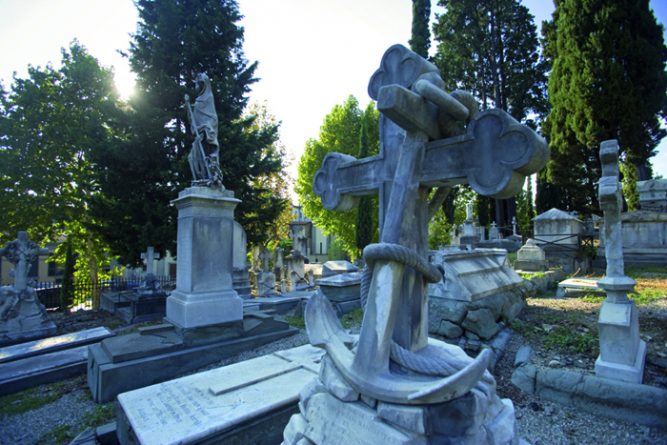International Poetry Reading Pays Tribute to the ‘English Cemetery’

A highly original September 16 event will feature an international group of Italian and English poets—including Elisa Biagini and Julia Bolton Holloway—who will each read a piece of their original verse as well as a poem by a chosen author in the setting of Florence’s historical “English Cemetery,” piazzale Donatello 38 (5:30 pm). The selections have been chosen to create a dialogue with celebrated foreign residents whose families chose the setting as a final resting place.
Belying its name, it is not exclusively an English Cemetery. During the 19th century the word “English” was synonymous with “foreigner.” It is owned by the Swiss Evangelical Reform Church that had acquired the land to build a cemetery was outside the walls of catholic Florence, which denied Protestants burial rights within the city.
The multitude of trees and marble statues at the Cimitero degli Inglesi is a picturesque representation mirroring the romanticism of the 19th century. Visitors can still view tombstones and wander among statues of weeping angels, the Grim Reaper and Egyptian serpents. Notable expatriates who are buried there include poet Elizabeth Barrett Browning (d. 1861), Giovan Pietro Vieusseux, founder of Florence’s international Gabinetto Vieusseux library; writers Walter Savage Landor, Fanny and Theodosia Trollop; and sculptors Hiram Powers and Joel Tanner Hart. The Uffizi’s Venus de’ Medici statue was to influence Hiram Powers, who arrived in 1837, in the creation of his signature sculpture, “The Greek Slave.” On the theme of slavery, the grave of minister and abolitionist activist Theodore Parker is found here, sculpted by William Wetmore Story. The venue also contains the tombs of U.S.Consul General James Lorimer Graham in addition to the last descendents of William Shakespeare
Built in 1828, the “English cemetery” was redesigned by Giuseppe Poggi into its distinct oval shape during the construction of Piazzale Donatello and the boulevards (viali) when Florence became the temporary capital of Italy in 1865. Today the cemetery looms above the road that follows the former circuit of the old city walls, like a ship or an island parting the waters. (rosanna cirigliano)
